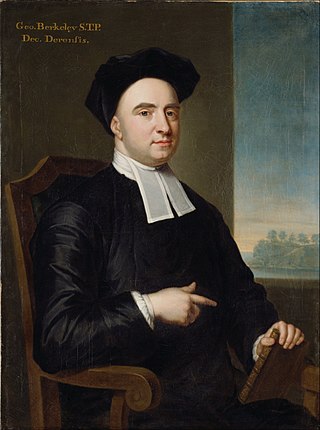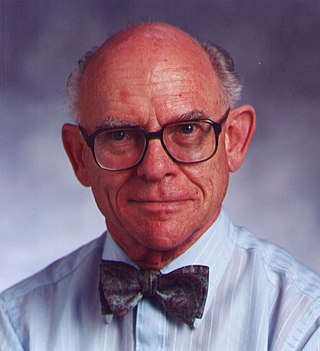Related Research Articles

George Berkeley – known as Bishop Berkeley – was an Anglo-Irish philosopher whose primary achievement was the advancement of a theory he called "immaterialism". This theory denies the existence of material substance and instead contends that familiar objects like tables and chairs are ideas perceived by the mind and, as a result, cannot exist without being perceived. Berkeley is also known for his critique of abstraction, an important premise in his argument for immaterialism.
George Sotiros Pappas is a professor of philosophy at Ohio State University. Pappas specializes in epistemology, the history of early modern philosophy, philosophy of religion and metaphysics. He is of Greek and English origin.
The history of science and technology (HST) is a field of history that examines the understanding of the natural world (science) and the ability to manipulate it (technology) at different points in time. This academic discipline also studies the cultural, economic, and political impacts of and contexts for scientific practices.

Stanley Louis Cavell was an American philosopher. He was the Walter M. Cabot Professor of Aesthetics and the General Theory of Value at Harvard University. He worked in the fields of ethics, aesthetics, and ordinary language philosophy. As an interpreter, he produced influential works on Wittgenstein, Austin, Emerson, Thoreau, and Heidegger. His work is characterized by its conversational tone and frequent literary references.

Early modern philosophy is a period in the history of philosophy that overlaps with the beginning of the period known as modern philosophy.
Indology, also known as South Asian studies, is the academic study of the history and cultures, languages, and literature of the Indian subcontinent, and as such is a subset of Asian studies.
Daniel A. Dombrowski is an American philosopher and professor emeritus of philosophy at Seattle University. Since 2009 he has served as Editor of the journal Process Studies, and is a past president of the Metaphysical Society of America (2018–19).

Stephen Roy Albert Neale is a British philosopher and specialist in the philosophy of language who has written extensively about meaning, information, interpretation, and communication, and more generally about issues at the intersection of philosophy and linguistics. Neale is a Distinguished Professor of Philosophy and Linguistics and holder of the John H. Kornblith Family Chair in the Philosophy of Science and Values at the Graduate Center, City University of New York (CUNY).
Stephen C. Levinson FBA is a British social scientist, known for his studies of the relations between culture, language and cognition, and former scientific director of the Language and Cognition department at the Max Planck Institute for Psycholinguistics in Nijmegen, the Netherlands.

Edmund Duncan Montgomery was a Scottish-American philosopher, scientist and physician. He was the husband of German-American sculptor Elisabet Ney.

Frank Albert Cotton FRS was an American chemist. He was the W.T. Doherty-Welch Foundation Chair and Distinguished Professor of Chemistry at Texas A&M University. He authored over 1600 scientific articles. Cotton was recognized for his research on the chemistry of the transition metals.
Colin Murray Turbayne was an Australian philosopher and an internationally recognized authority on the writings of George Berkeley. He spent most of his thirty five year academic career at the University of Rochester and was noted as the author of the book The Myth of Metaphor.
John Daniel Wild was a twentieth-century American philosopher. Wild began his philosophical career as an empiricist and realist but became an important proponent of existentialism and phenomenology in the United States.
Berkeley Studies is an annual on-line academic journal established in 1977. It publishes scholarly articles on anything related to George Berkeley. The journal also gives news of the last events in Berkeley scholarship: book reviews, information about coming pertinent conferences, and abstracts from reports delivered at such conferences. Assembling bibliography on Berkeley constitutes an essential part of the editors' work.
Stephen D. Biddle is an American author, historian, policy analyst and columnist whose work concentrates on U.S. foreign policy. Currently, he is the Professor of International and Public Affairs at School of International and Public Affairs, Columbia University. He received recognition for his 2004 book Military Power: Explaining Victory and Defeat in Modern Battle, published through Princeton University Press. He also has worked in groups under Generals Stanley McChrystal and David Petraeus forming U.S. counter-insurgency policy.

George Malcolm Stratton was an American psychologist who pioneered the study of perception in vision by wearing special glasses which inverted images up and down and left and right. He studied under one of the founders of modern psychology, Wilhelm Wundt, and started one of the first experimental psychology labs in America, at the University of California, Berkeley. Stratton's studies on binocular vision inspired many later studies on the subject. He was one of the initial members of the philosophy department at Berkeley, and the first chair of its psychology department. He also worked on sociology, focusing on international relations and peace. Stratton presided over the American Psychological Association in 1908, and was a member of the National Academy of Sciences. He wrote a book on experimental psychology and its methods and scope; published articles on the studies at his labs on perception, and on reviews of studies in the field; served on several psychological committees during and after World War I; and served as advisor to doctoral students who would go on to head psychology departments.
The International Berkeley Society (IBS) is a US-based organization that is aimed at promoting interest in the life and work of the philosopher Bishop George Berkeley. Its president is currently Nancy Kendrick.
Nancy Kendrick is an American philosopher and William and Elsie Prentice Professor of Philosophy at Wheaton College (Massachusetts). She is known for her expertise on George Berkeley and has been president of the International Berkeley Society since 2015.
Joseph S. Alter is an American medical anthropologist known for his research into the modern practice of yoga as exercise, his 2004 book Yoga in Modern India, and the physical and medical culture of South Asia.
References
- ↑ "Daniel Stepping Down after 10 Years; Kendrick to Assume Presidency" (PDF). International Berkeley Society . Retrieved 9 June 2017.